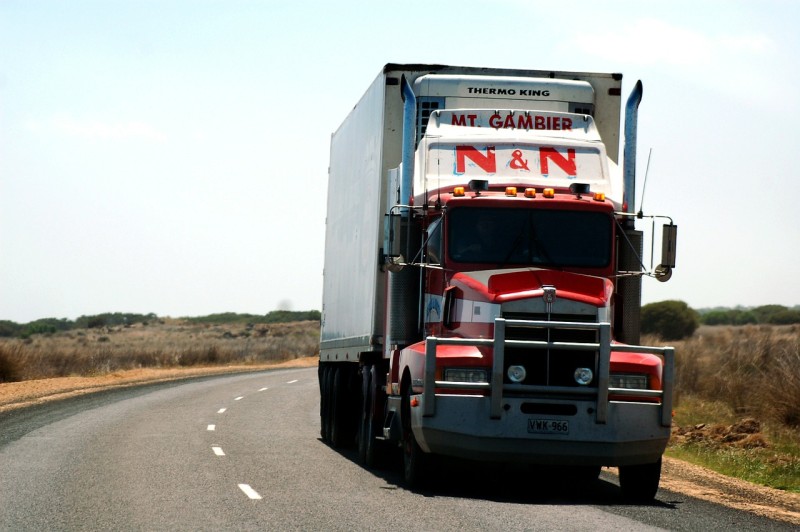Drivewyze says it will install all 19 WIMs, with CEO saying, “We’re going to do it.”
JEFFERSON CITY, Mo. – Missouri State Highway Patrol and Missouri Department of Transportation reviews completed this week removed state employees from bypass service provider HELP, Inc.’s board of directors, putting the Missouri’s bypass vendor situation back into the news.
“Separate, contractual relationships have now been formed between the State of Missouri and two bypass service providers,” the MSHP statement reads. “Due to these contracts, we no longer see the need for a Patrol representative to serve on this board.”
“I commend Colonel Sandra Karsten and the Highway Patrol for ending the years-long practice of having a Patrol representative serve on the board of directors of a vendor. Even the perception of a conflict of interest can diminish the public trust,” Department of Public Safety Director Drew Juden said in a statement released Wednesday afternoon. ‘We should not simply accept the policies and practices of past administrations because they were considered standard operating procedure. The Department of Public Safety and its divisions will aim for the highest standards.”
MoDOT also cited the new contract signing as reasoning for stepping away from the board.
“Nearly two decades ago, truckers traveling in Missouri encountered delays and long back-ups impacting interstate traffic because they had to pull into weigh stations,” MoDOT’s statement reads. “Subsequently, the Missouri Department of Transportation worked with HELP Inc., to create a new industry utilizing advanced technology to validate safety data and weigh commercial vehicles. This non-profit, public-private partnership created financial and safety benefits for Missourians. MoDOT also had a staff person serve as a board volunteer to assist in this evolving industry.
“On May 3, Missouri Highway and Transportation Commissioners discussed concerns about perceptions of MoDOT employees serving as volunteer board members for HELP, Inc. Given the recent signing of contracts with two different vendors to provide weigh station services, MoDOT staff will no longer serve as board volunteers.”
HELP, Inc. CEO Karen Rasmussen was quick to release a statement.
“We are disappointed that Missouri agencies felt it necessary to take this action. Nevertheless, HELP has committed to both agencies that there will be no interruption in the commitment our public/private partnership has made to continue providing reliable and accurate weigh station bypass services to support Missouri’s and HELP’s mutual mission of highway safety.”
In mid-April, MoDOT awarded proposals to both HELP, Inc., and Drivewyze to manage Missouri’s weigh in motion (WIM) scales. HELP, Inc. currently owns Missouri’s WIMs, something wholly unique to the state of Missouri as Missouri is the only state in the union to not own their WIM sensors.
“Missouri is very unique in that it’s the only state in the country that HELP, Inc. provided the WIM systems,” Brian Heath, CEO of Drivewyze, said. “There is no other state in the country that all the systems were provided. It’s very rare that the state doesn’t own the WIMs.”
Rasmussen says Missouri is unique in another way.
“Missouri has a very specific state statute enacted in 1999 mandating that any commercial vehicle operating in the state must be weighed, either in a weigh station on a static scale or using weigh-in-motion (WIM) technology,” Rasmussen said. Missouri’s expansive highway system and central location make it a regular pass-through for truck drivers.
Despite Missouri’s WIMs being owned by HELP, Inc., they also underwrite WIMs in other states.
“HELP routinely underwrites the cost of weigh-in-motion scales on all new PrePass installations unless states have funding to install their own,” Rasmussen said. “In addition, 11 WIM retrofits are underway at existing PrePass sites in several states that did not previously have WIMs.”
A second company wanting to do business in Missouri put Missouri under a microscope.
“Drivewyze provides software that integrates with truck technology, enabling them to request bypasses,” Heath said. “Today, Drivewyze offers the largest weigh station network in the country. We operate and have agreements to operate in 43 states and we have twice as many sites as the nearest competitor.”
Request for Proposal #6-170315DR was granted April 10, 2017, to both Drivewyze and HELP, Inc. The RFP is for “Commercial Motor Vehicle Electronic Preclearance and Bypass System.” With HELP, Inc. currently owning the sensors, it looks as if Drivewyze will be installing a second set of sensors at all 19 weigh stations around the state.
Drivewyze only wanted to install sensors at eight weigh stations in order to meet their customer’s needs, but the RFP and following contracts require Drivewyze to install in all 19. Rasmussen said that HELP, Inc. has no problem with Drivewyze installing their own sensors.
“If the data is not shared, Drivewyze will have to install,” Heath said. “There would be redundant systems. We would be tearing up the state’s infrastructure. It’s ridiculous, it’s a poor model. But, if that’s the case, we’re going to do it.”
But, due to customer demand, Drivewyze is willing to do whatever it needs to in order to do business in Missouri.
“As the state operates the programs, we are going to operate within whatever laws are in Missouri,” Heath said.
In 2002 HELP, Inc. offered to pay for the state’s sensors and weigh in motion (WIM) equipment, rather than the state being forced to make the investment themselves – a seemingly ideal situation at the time for a cash-strapped state. In fact, Missouri is the only state that does not own its own WIM sensors and related equipment, as it was all provided by HELP, Inc.
Currently, HELP, Inc., and Drivewyze operate concurrently in over 20 states – each of those states own their own sensors.
The dispute was brought to a head with the filing of a House bill by Rep. T.J. Berry who later claimed that the FBI was investigating both the Highway Patrol and MoDOT in their roles as both regulators of the system and HELP Inc. board members. The bill died on the floor a couple weeks ago, only to be defeated again today as an amendment to another bill.
“In every state in the country that has WIM systems that are using the system for bypass, HELP and Drivewyze systems are integrated. HELP Inc. uses the data, Drivewyze uses that data,” Heath said. In other states, there are other bypass programs and the same thing happens. They all share the data from the weigh in system.
“I think, in general, any company just wants to operate in an environment that offers fair and open competition,” Heath said.
“If you’re acting in the state’s best interest, the state owns the equipment,” Heath said. “The states have no restrictions on the use of that equipment – vendors would be allowed to integrate into the state’s system. This recently happened in Arkansas and California. The power is with the states, where it should be. The state is at no risk of canceling the contract of providing the equipment. It’s in the state’s best interest to own that equipment and gives them a better negotiating position to make sure vendors are providing the services they say they are.”
Estimates range from $1.2 million, according to Drivewyze, to $20 million, according to MoDOT, to buy and install the sensors.
“It would depend on the condition of the pavement and other factors,” Rasmussen said. “The ASTM Type 3 WIM standards that are the only WIMs certified for truck weight enforcement also specify the type and condition of pavement surfaces. Properly installing the correct WIM usually ranges from a low of around $200,000 to a high of $375,000, depending on a number of construction factors. The Missouri WIMs also cost HELP an average of $440,000 annually for maintenance to ensure they are working properly and correctly transmitting truck weights and correlating them to the correct vehicle.”
Regardless of cost, the money is arguably something MoDOT just doesn’t have.
“The problem in Missouri comes down to highway funding or the lack of it,” Tom Crawford of the Missouri Trucking Association, who sat on the HELP, Inc. board with MoDOT and MSHP, said. “As I understand it before 2001-2002, HELP had never purchased a WIM. All of the other states where they were doing business to that point had put them in at their own cost. Missouri couldn’t afford to do it, so HELP agreed to install WIMs at their own cost, in an effort to have the opportunity to do business in Missouri.”
Currently, Drivewyze does not operate in Missouri. Drivewyze had a pilot in the state in the fall of 2014, which was canceled by the state to their surprise.
“We had a very successful pilot,” Heath said. “We had zero complaints, we had positive feedback. There were no service requests that we weren’t responsive to. Tens of thousands of vehicles received bypass permissions.
“We were surprised that they were not happy with our performance. Anecdotally, there was nothing ever documented to that extent.”
A source working for Drivewyze told The Missouri Times that during the pilot program, because Drivewyze had no WIM sensors, no trucks that subscribed to the Drivewyze service were weighed unless the program’s algorithm forced the driver to physically stop at the weigh station.
Heath cites the increasing and continuing new requirements as a turning point for the pilot.
“We tried very hard to meet those requirements, but it turned into a moving target. With each new requirement, we said we would meet it.”
Those requirements ranged from supplying computers and receiving WIM data from the MSHP and MoDOT.
There are two layers of data – weigh in system data and bypass data, which has been a source of contention between the two providers.
“We have no interest in the HELP, Inc. bypass data,” Heath said. “That’s proprietary information, that’s their proprietary data and we respect that. The claim that we’re asking for private data from HELP, Inc. is not true. We have only ever asked to access the weigh in subsystem data.”
HELP, Inc. has repeatedly expressed concern that their nonprofit status would be threatened if they shared their data with Drivewyze.
With the fiery exit of a legislative proposal to address components of tension between Drivewyze and HELP, Inc., including the state employees sitting on the HELP, Inc. board, other state agencies, including the State Auditor, have gotten involved. The State Auditor is expected to release a report by the end of the year.
Meanwhile, the third HELP, Inc. board member, Crawford, says he will continue to assist HELP, Inc. going forward, saying, “There are provisions for the extension of my service on the board.”
“When we operate in a state, we implement programs to communicate with agencies and programs to operate,” Heath said. “We will work with state partners who would be running the system and also to communicate with the industries where the system is implemented. Partnering could be as little as an agency letting us put their logo on the site so our clients are aware that we are operating legally. It gives truckers some comfort that the state agency is aware of the program. We try to do it and communicate with the agencies and associations.”
Rachael Herndon was the editor at The Missouri Times and also produced This Week in Missouri Politics, published Missouri Times Magazine, and co-hosted the #MoLeg podcast. She joined The Missouri Times in 2014, returning to political reporting after working as a campaign and legislative staffer.
Rachael studied at the University of Missouri – Columbia. She lives in Jefferson City with her husband, Brandon, and their two children.




